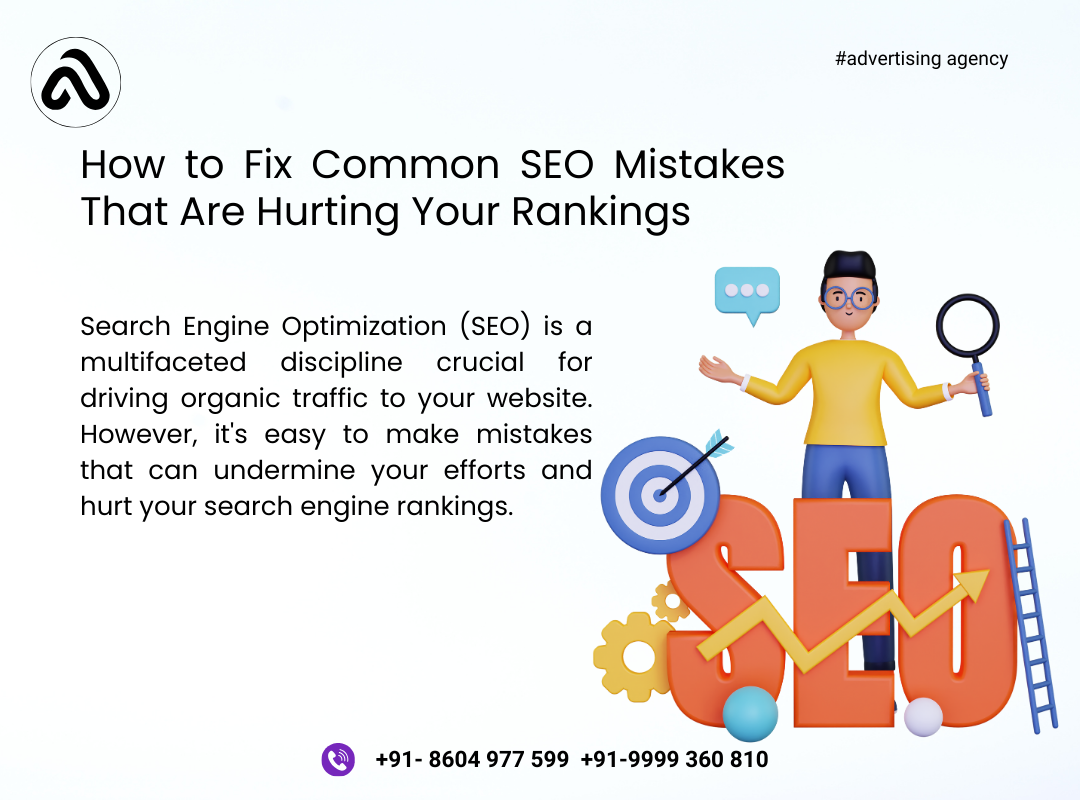

Search Engine Optimization (SEO) is a multifaceted discipline crucial for driving organic traffic to your website. However, it's easy to make mistakes that can undermine your efforts and hurt your search engine rankings. Understanding and correcting these common SEO errors is essential for improving visibility, increasing traffic, and achieving your online marketing goals.
SEO is the process of optimizing your website to rank higher in search engine results pages (SERPs). Effective SEO involves a combination of strategies and techniques, including keyword research, on-page optimization, technical SEO, and off-page strategies. Mistakes in any of these areas can lead to poor rankings and decreased visibility.
Mistake: Keyword stuffing involves overloading a webpage with keywords in an attempt to manipulate search engine rankings. This can make content less readable and can lead to penalties from search engines.
Solution:
Example: Instead of repeating “best running shoes” excessively, write: “If you're looking for the best running shoes for marathon training, consider these top options.”
Mistake: Meta descriptions are short summaries of a webpage's content that appear in search results. Neglecting them can lead to missed opportunities to entice users to click through to your site.
Solution:
Example: Instead of a generic description, use: “Discover the top 10 running shoes for 2024. Read our comprehensive reviews and find the perfect pair for your next marathon.”
Mistake: With the increasing use of mobile devices, a site that isn’t mobile-friendly can suffer from reduced rankings and user engagement.
Solution:
Example: A responsive design would adjust text size, image scaling, and navigation menus to fit various screen sizes, ensuring a smooth user experience.
Mistake: Internal linking helps distribute page authority across your site and enhances user navigation. Neglecting internal links can limit the visibility and ranking potential of your pages.
Solution:
Example: Link from a blog post about “SEO Strategies” to another post about “Keyword Research Tips” with descriptive text like, “For more on effective keyword research, read our comprehensive guide.”
Mistake: Technical SEO encompasses various factors such as site speed, crawlability, and security. Ignoring technical issues can prevent search engines from indexing your site properly.
Solution:
Example: Improving site speed might involve compressing images and leveraging browser caching to reduce load times and improve user experience.
Mistake: Content is a key factor in SEO. Thin, low-quality, or duplicate content can negatively affect rankings.
Solution:
Example: Instead of a brief article, write an extensive guide on “The Ultimate Guide to SEO,” covering various aspects in detail with actionable tips.
Mistake: For businesses with a physical presence, neglecting local SEO can result in missed opportunities to attract local customers.
Solution:
Example: A local bakery should optimize their website for keywords like “best bakery in [City]” and ensure their Google My Business listing includes their location and business hours.
Mistake: Failing to use analytics tools means missing out on valuable insights into your website’s performance and user behavior.
Solution:
Example: If analytics show a high bounce rate on a specific page, consider improving the content or layout to better engage visitors and keep them on the site longer.
Mistake: Large, unoptimized images can slow down your site, negatively impacting user experience and rankings.
Solution:
Example: An image of a product should have alt text like “Red leather running shoes” to provide context and aid in search engine indexing.
Mistake: While social signals (likes, shares, and comments) are not direct ranking factors, they can influence SEO indirectly through increased visibility and traffic.
Solution:
Example: Sharing a blog post on social media with a compelling headline and image can drive traffic and potentially earn backlinks from other sites.
Conduct regular SEO audits to identify and address any issues that may arise. Use tools like SEMrush or Ahrefs to analyze your site’s SEO health.
SEO is an ever-evolving field. Stay informed about the latest algorithm updates, industry news, and best practices by following reputable SEO blogs and forums.
Consider investing in SEO training and tools to enhance your knowledge and improve your SEO efforts. Platforms like Moz Academy or HubSpot offer valuable resources for learning and optimizing SEO strategies.
Fixing common SEO mistakes is crucial for maintaining and improving your search engine rankings. By addressing issues like keyword stuffing, poor mobile optimization, and neglecting internal linking, you can enhance your website’s performance and visibility. Implementing best practices and continuously monitoring your SEO efforts will help ensure long-term success and a strong online presence.